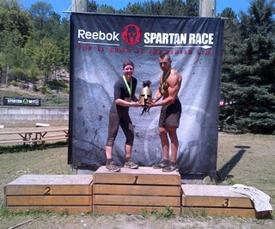Body Fat Percentage

theredcliche
Posts: 233 Member
Do you guys trust the body fat calculation on your scales at home? I don't really know how it measures it, but mine has changed, I just don't know how reliable it is. I know I could go to a doctor and measure my body fat with calipers and stuff, but I'm not that unsure of the my scale - just wondering what you guys think.... Oh and mine was 22% (145 lbs) before beginning Jillian Michaels' Body Revolution and now it's 19% (136 lbs).
0
Replies
-
Do you measure it at the same time? Best time is when you wake up in the morning before you eat.0
-
yep - after using the bathroom ha ha
 0
0 -
actually the best time to get your bmi is the middle of the afternoon0
-
Body fat calculations from digital scales are very inconsistent and inaccurate. They have a margin of error of over 5%. I've actually seen a supposed 5% change in body fat in a 24 hour period, just to see it swing back the other way a few days later. They use electricity to measure water content, and calculate it based on that. Any fluctuation in water retention will screw up the reading.0
-
Personally I wouldn't really trust anything that is simply using you height, weight, and age to measure body fat % accurately...0
-
actually the best time to get your bmi is the middle of the afternoon
BMI is not he same as BF%, BMI does not account for the amount of muscle and is just a function of height and weight.
that being said the scales can be way off, so your BF% is probably not what it says you are, but as long as it is moving in the right direction you are making progress, regardless if the number is accurate or not.0 -
Wow, you have done an awesome job, I bet you are excited! I don't have a scale that measures body fat but would love to know what my percentage is. I am kinda scared to know though!! I'm 5'2 and 135 lbs.......I think my goal weight would be 115 but I don't want to be skinny fat so I really don't care about the lbs as long as my fat percentage is good.0
-
I've heard water weight can make a big difference in those scales' readings. might be worth it to go somewhere where they can measure you w/ calipers!0
-
Body fat calculations from digital scales are very inconsistent and inaccurate. They have a margin of error of over 5%. I've actually seen a supposed 5% change in body fat in a 24 hour period, just to see it swing back the other way a few days later. They use electricity to measure water content, and calculate it based on that. Any fluctuation in water retention will screw up the reading.
^^ THIS. If you can't get your BF% measured accurately, get a pair of calipers and measure monthly. Even if you measure wrong, as long as you do it the same way consistently it'll show you a change and is far more accurate then showing you water fluctuations in your body as your scale does.0 -
Yea, i took mine back to walmart after 3 days of wild swings in BF%, it could be off by 3-5% weighting back to back, so i have them do it at the Dr. office or at the gym now.0
-
Personally I wouldn't really trust anything that is simply using you height, weight, and age to measure body fat % accurately...
High Tech scales don't use height weight and age to measure BF%. There's usually little electrodes on the scales that send a small electrical signal throught your body. Water, muscle and fat all conduct electricity differently.0 -
If you can get it/afford it, the immersion test for body fat % is the most accurate method out there. The next best is callipers, followed by the hand-held gizmos, then finally the scale that measures through the feet. My scale bf% goes up when I go down in weight. Figure that one out!0
-
Well even if it has a margin of error, the trend was that you lost that number +/- 5%. That's a significant drop, so congratulations! Most body-fat measurement techniques are inaccurate, but if you use the technique consistently and see a drop, then you probably had a significant drop. I'd just leave it at that..0
-
I've heard water weight can make a big difference in those scales' readings. might be worth it to go somewhere where they can measure you w/ calipers!
This is VERY correct. My Dr. once told me if you have drank a lot of water, your BF % Can be wrong. I have a handheld one like you see in the gyms. I don't trust the scale ones. My scale has one, it is slightly off.0 -
See if the Bod Pod test is offered in your area - It's 2nd best to the Immersion...I had it done last Sept & will be re-tested in May.0
-
I hope it's incorrect because according to your numbers you lost 3 lbs of muscle since the beginning of Jillian's program.0
-
I hope it's incorrect because according to your numbers you lost 3 lbs of muscle since the beginning of Jillian's program.
While losing fat you will lose lean mass, not all of the 3 lbs of lean mass will be muscle, but some will) Lean mass is everything that is not fat.0 -
Do you measure it at the same time? Best time is when you wake up in the morning before you eat.
I understand that weight can vary greatly throughout the day, but why should your body fat % fluctuate? Things like water weight and food can change your weight, but those don't change BF%.0 -
Well even if it has a margin of error, the trend was that you lost that number +/- 5%. That's a significant drop, so congratulations! Most body-fat measurement techniques are inaccurate, but if you use the technique consistently and see a drop, then you probably had a significant drop. I'd just leave it at that..
That's the problem with the margin of error. A 22% measurement could be anywhere from 17-27%, and a 19% measurement could be anywhere from 14-24%. So even though the scale shows a 3% drop, it could easily be a 5 or 6% gain, and you'd never know.0 -
lol - thanks guys for all the answers!!! i'll look into a better method!
 0
0 -
I have a Taylor Body Fat Monitor & Scale. I'm pretty sure it isn't "accurate" but, I don't see wild fluctuations in numbers so it's probably precise enough to be a reasonable indicator of progress. I have dropped about 24 pounds since I joined MFP and by percentage, the scale shows me loosing about 15 pounds of fat. I forgot to write down my body composition by water but I think it has gone up by about 3% points from memory, so that translates to a loss of about 7 pounds for a total loss of about 22 pounds. I assume that means a 2 pound loss of dry muscle mass and possibly bone. I'm sure there is some rounding errors, fuzzy math, and memory (brain) errors, but sounds about right, I think.... In my opinion it is as good as doing the caliper thing at home and a lot eisier to do. Obviously not as good as a dunk tank or a dual energy X-ray absorptiometry but were just tracking progress right?0
-
Do you guys trust the body fat calculation on your scales at home?
Oh good lord no...
My actual body fat percentage is 20%
According to my scale, it's between 25% and 39% ... depending on the day.
It can and will fluctuate based on how much water is currently in your body. I would not invest in a scale, they are not accurate at all. Calipers are reasonably accurate, or go for a full immersion test. If all you have available to you is a scale that measures bf%, don't bother using it.0 -
i have a withings scale that is meh - fluctuates like most have said. Bought the calipers for 5 bucks on amazon. These are a great tool. Cheap and easy to use0
-
I can now say from personal experience that those scales can be 10% off. Today mine said 33%. This evening, I had the imersion testing done ( most accurate) by Fitness Wave and it showed 23%. So happy to finally know!0
-
I'm sharing what I have posted on two threads yesterday in regards to Body Fat percentage.
I own both a body fat scale and Omron handheld monitor and I trust both of them. Some people are against a body fat scale and Omron Handheld Monitor, they feel that these devices aren't accurate, which all devices aren't 100% accurate, the only thing that's said to be 100% accurate is an autopsy and no one will find out their true body fat percentage then.
Some people think that the body fat scale or Omron handheld aren't accurate, because they have read online or have been told that the Bod Pod, Dunk Test and Dexa Scan are accurate devices. These people probably have gotten tested on a body fat scale or used an Omron handheld body fat monitor and their body fat percentage number was different from the number they have gotten from a Bod Pod test, Dunk Test or Dexa Scan test.
A Dexa Scan Test will give you a higher body fat percentage than the scale, Omron monitor, Bod Pod and Dunk Test, because it includes the fat in your brain, bones and organs.
I will list the margin errors according to this site: http://www.shapefit.com/body-fat-testing.html
Dexa Scan +/- 2-3% margin error (Cost $100)
Hydrostatic Weighing/Dunk Test +/-2-3% margin error. Accuracy depends on the amount of air a person expel. If all the air isn't blown out, the test will not be as accurate.
Bioelectrical Impedance (Body fat scale or handheld monitor). I'm quoting them here: "This method CAN be accurate (4% margin of error) but the results are affected by hydration, food intake and skin temperature. If you're dehydrated, you're body fat percentage will read higher than it is."
According to this site, the Bod Pod Test has a +/- 3% margin error: http://www.humanhealthspecialists.com/bodpod-body-fat-testing/bod-pod-faqs/
A body fat scale measures the lower half of the body and an Omron handheld body fat monitor measures the top half of the body. Both devices can give a person the same reading and guess what's the person's total body fat percentage is: Answer: The body fat percentage both devices gave the person.
For example if both the body fat scale and Omron handheld monitor gives a person a 35% body fat reading. Then that person's total body fat percentage is 35%, why? Because, 35 + 35 = 70 and 70/2 = 35.
It's possible that both devices can give different readings, but it doesn't mean that one of the devices didn't give the total body's body fat percentage or came close to it.
Example: The scale can read 35% and the Omron handheld can read 33%. 35 + 33 = 68 and 68/2 = 34. 34% falls between 33% and 35%.
Some people are top heavy and bottom small and some people are top small and bottom heavy, whatever device they use to measure their smaller half, the reading will be lower than the other device. For example, a woman that's small at the top and bottom heavy can have a top reading of 25% and bottom reading of 35%. Total body percentage: 25 + 35 = 60 and 60 /2 = 30
I've said all that to say, just because a Bod Pod test, Dunk Test or Dexa Scan has your body fat percentage at 30% and a body fat scale or Omron handheld monitor had your body fat percentage at 35% it doesn't mean the body fat percentage scale or Omron handheld monitor isn't right or close to the body fat percentage reading. Keep in mind, A Bod Pod Test, Dunk Test and Dexa Scan also have a +/- margin error.
If you want to pay to get a Bod Pod Test, Dunk Test or Dexa Scan test go for it, but if I can suggest something to you, I would suggest, the day before your testing or on the same day if possible, get your body fat percentage tested on a body fat scale and Omron handheld body fat monitor and add the percentages up and divide it by two to see what your percentage comes out to be. Compare the total body fat percentage number to the other test's number to see if they are the same or close. If they are the same or close, I think you should save your money and just focus on using a body fat scale, Omron handheld body fat monitor or both. If you own both, you will come out cheaper than spending money for those other tests, unless you just want to continue spending money on those other tests.0 -
I use my scale with bf % and measurement calculated bf % to monitor progress. I know those are probably not correct numbers, but mine are pretty consistently going down and I only use the actual numbers to make sure I'm not losing too much lean mass. I'll figure out actual numbers when I'm where I think I want to be.
 0
0 -
the scales can be way off, so your BF% is probably not what it says you are, but as long as it is moving in the right direction you are making progress, regardless if the number is accurate or not.
I have mine measured at the gym every 1.5-2months (this is a possibility depending on what your gym offers...if they just use a scale like yours, there is no point). But I agree with the guy that posted the above: if your scale shows it going down, then that's a good sign.0 -
The Navy method is pretty accurate, and you just need a tape measure... here is a website to show you what you need
http://www.healthstatus.com/calculate/body-fat-percentage-calculator0 -
Personally, I hate the body fat monitor at our gym. It is an Omron. When I put in all of my stats and my age (42) it says 21%. When I put my age as 21, same stats just different age, it says 17.5%.
So, I know that these should be a gauge, but the BF monitors are no fun as you get older!! If I keep this same body at age 52, 10 years older, I jump up another 2%....I know because I did it with the age 52! Very discouraging!0 -
I have 2 stand on monitors and a hand held. The 2 stand ons are 5% difference! So do I have more fat than I thought? 5% is quite a change :-(.
I have been using the one scale for 5 months and was disappointed when I hopped on the older scales to find out it increased by 5% so I haven't lost as much as I thought :-(0
This discussion has been closed.
Categories
- All Categories
- 1.4M Health, Wellness and Goals
- 398.1K Introduce Yourself
- 44.7K Getting Started
- 261K Health and Weight Loss
- 176.4K Food and Nutrition
- 47.7K Recipes
- 233K Fitness and Exercise
- 462 Sleep, Mindfulness and Overall Wellness
- 6.5K Goal: Maintaining Weight
- 8.7K Goal: Gaining Weight and Body Building
- 153.5K Motivation and Support
- 8.4K Challenges
- 1.4K Debate Club
- 96.5K Chit-Chat
- 2.6K Fun and Games
- 4.8K MyFitnessPal Information
- 12 News and Announcements
- 21 MyFitnessPal Academy
- 1.5K Feature Suggestions and Ideas
- 3.2K MyFitnessPal Tech Support Questions





















